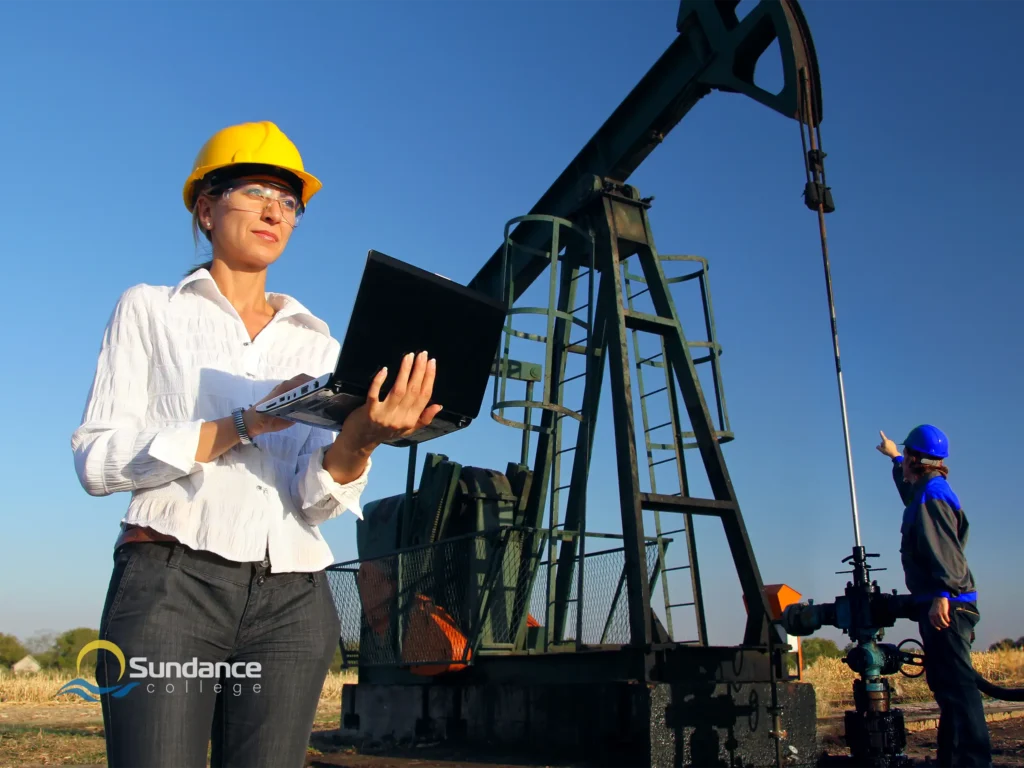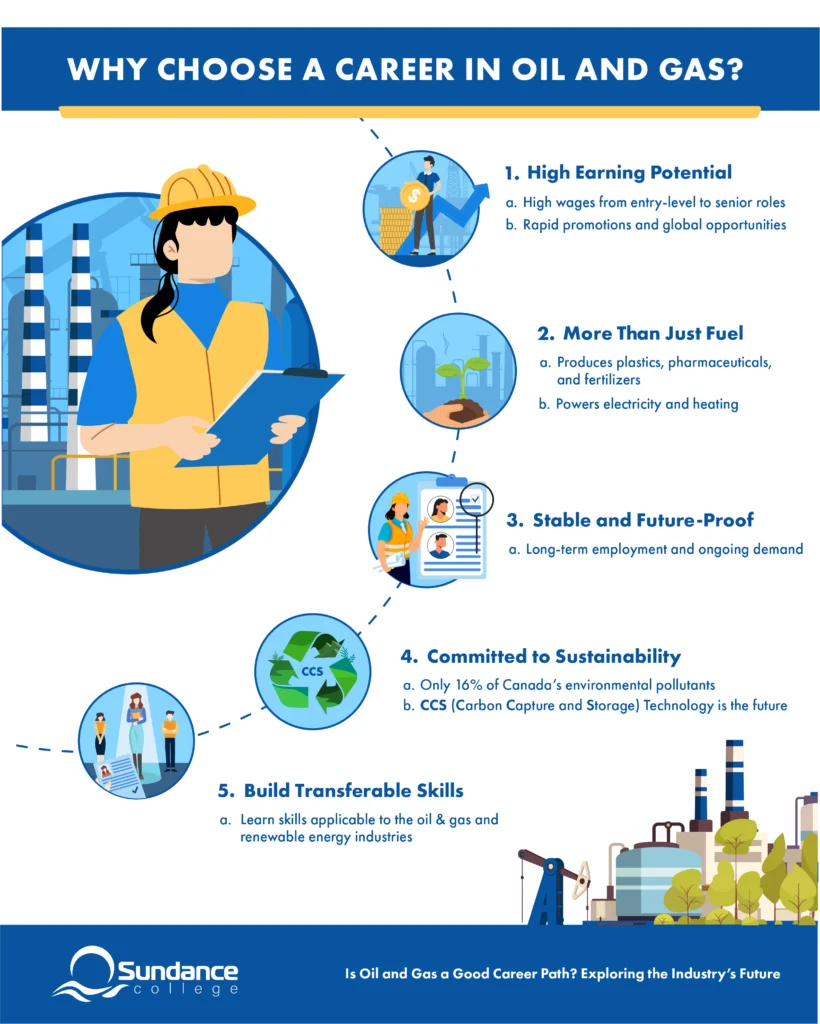Blog / Is Oil and Gas a Good Career Path? Exploring the Industry’s Future
Is Oil and Gas a Good Career Path? Exploring the Industry’s Future

Oil and Gas Administration Diploma
- Oil & Gas Administrative Assistant
- Land Systems Assistant
- Mapping Assistant
- Project Assistant
The oil and gas industry has been booming for decades, attracting many workers with its appealing wages and exciting work environment. It contributes enormously to the Canadian economy, as well as economies around the world, and despite varied perceptions and economic fluctuations, the industry remains resilient and stable.
According to Pola A., and Oil and Gas Administration diploma program instructor at Sundance College, “People fear that fluctuations in oil and gas signal the industry’s end. But that’s far from the truth. This industry isn’t going anywhere.”
The oil and gas industry continues to produce everything from medicines and cosmetics to paints and shoe polish, and the demand for skilled workers in this field is higher than ever.
In this article, we’ll take a look at the complex landscape of the oil and gas industry, addressing common questions and misconceptions along the way, and exploring the reasons why it remains an attractive career choice. We’ll also discuss the best ways to gain the skills, knowledge, and experience you need to begin your career in oil and gas.
Listen to: ‘Is Oil and Gas a Good Career?’
What is the Oil and Gas Industry?
The oil and gas industry is a major player in the global energy sector, responsible for everything from the exploration and extraction of fuel to refining and distributing it. While gasoline and diesel are a big part of the industry, its reach is much broader than what you may think. The natural resources extracted from oil and gas are crucial for producing a wide array of products that we use daily.
Each morning, you’re probably awakened by an alarm on your cell phone or iPad. You rub your eyes and put on your glasses, then slide out from under your cozy electric blanket. In the bathroom, you put some toothpaste on your toothbrush and brush your teeth before taking a shower, shampooing your hair, and freshening up with some deodorant. But not before you’ve turned on your coffee maker so you can feel awake and ready to take on the day.
When it’s time to head out the door, you likely put your laptop into your backpack, slip on your shoes and sunglasses and begin your journey to the office. There, you’ll look at your computer monitor while typing on your keyboard, maybe you’ll even chew some gum to help you focus.
From the moment you wake up to the time you retire for the night, these everyday items contribute significantly to your comfort and efficiency, and each item is created with the help of the oil and gas industry.
Sundance College’s Oil and Gas Administration program instructor, Pola, puts it best: “When you’re talking about the oil and gas industry, it’s beyond just fuel. You’re talking about essentially mining for carbon and hydrogen, which are the building blocks or organic compounds”
Natural gas provides a source of energy for electricity and heating, cooking, and power generation, keeping our lights on and making sure we stay warm each and every day. Plastics, synthetic materials, pharmaceuticals, and even fertilizers that help grow our food – all of these come from oil and gas. Petrochemicals and natural gas components such as methane, propane, and ethane play a huge part in the manufacturing of over 6,000 products that we use of a daily basis.
The oil and gas industry plays a huge part in our lives and understanding its scope helps us recognize how critical the oil and gas sector is to our world.
Environmental Impact and Sustainability
Environmental impact is a hot topic when it comes to discussing the oil and gas industry, and there’s more going on than you may think – especially in terms of sustainability. Recent innovations like carbon capture and storage (CCS) technology have dramatically reduced emissions and paved the way for a more sustainable future. The International Energy Agency have said that it’s a huge contributor to reaching net-zero.
As it stands, the industry contributes only 16% of Canada’s environmental pollutants, far behind the mining industry which contributes 54%. As global regulations also continue to nudge the industry towards cleaner and more sustainable operations, the ever-evolving industry will continue to change to keep up with the times.
Oil and Gas Administration instructor Pola emphasizes, “By smartly using oil and gas, we can manage without any problems. We can survive without global warming, and there will be no shortage of essential products derived from oil and gas.”
He also remains optimistic about the increasingly innovative industry’s ability to evolve: “Research in oil and gas has significantly evolved over the past forty to fifty years, leading to more environmentally friendly practices and products. I’m sure the industry will continue to adapt and innovate.”
These ongoing changes reflect the industry’s dedication to overcoming environmental challenges and paving the way for a sustainable future for everyone.

Stability and Future Outlook
The oil and gas industry has always provided stable, long-term employment because, let’s face it, the world needs energy! Advances in technology, exploration, and research continue to uncover new oil and gas reserves. Even though fossil fuels themselves aren’t going to last forever, the continual development of the sector with allow it to play a vital role in clean energy production.
Sundance College instructor, Pola, addresses the misconceptions about the longevity of the oil and gas industry: “Even if oil and gas were to dry up in forty years – which is unlikely, we have the knowledge and resources to transition to renewable energy sources like hydro and geothermal energy. The skills and knowledge gained from a diploma program and experience in the oil and gas field are transferable. So jobs in the industry remain secure.”
The shift to renewable energy won’t happen overnight: “The oil and gas industry is not going to disappear overnight. It will take time to transition to renewable energy sources, and during this transition, there will still be a need for oil and gas and the skills associated with it,” Pola explains.
This perspective shows that the oil and gas industry is not just surviving but actively preparing for the future, offering stable job opportunities while adapting to the global move towards renewable energy sources.
Earning Potential and Career Outlook

High wages and good growth opportunities are often significant draws for those considering oil and gas careers. Workers in oil and gas companies are highly valued and well-compensated, from entry-level positions to senior management roles in engineering, administration, and project management.
Whether it’s working out in the field extracting oil and gas or going into the research side of the industry, dedication and hard work can lead to rapid promotions, meaning there’s plenty of room to grow and take control of your career path.
While the global reach of the oil and gas production industry often leads to international opportunities for work, Pola also emphasizes the equally rewarding nature of these jobs at home: “In Canada, the oil and gas industry offers good-paying jobs. With the right skills, education, and Canadian experience, those entering the industry can find high paying positions.”
If you’re thinking about your future, the oil and gas industry offers a clear path to both financial stability and exciting career prospects, at home and around the world.
Gaining Experience, Networking, and Building Skills
Breaking into the oil and gas industry requires a combination of experience, connections, and specific skills, so enrolling in a diploma program can be your golden ticket to your future. For example, Sundance College designed its accelerated program to not just show you the ropes with instructors like Pola, but also to open up industry networking opportunities and equip you with the technical and soft skills you need to succeed.
The Oil and Gas Administration Diploma program at Sundance College covers everything from the technical aspects of oil and gas operations to building communication and problem-solving skills. Pola highlights the practical benefits of the program: “Having a diploma from a college like Sundance College can significantly enhance students’ prospects for employment in the industry.”
“Working in the oil and gas industry requires a range of skills for different areas of the industry, from production accounting to exploration and research. Participants in the program learn transferable and valuable skills that are applicable in other sectors as well.”
If you want to enter the oil and gas industry but have concerns about not having what it takes, you need the right education and training to get started.

The oil and gas industry not only fuels our daily lives but also offers a wide range of opportunities for anyone looking for an adventurous and rewarding career. With the right training and industry connections, you can begin a career path in an industry that boasts stability, adaptability, and growth.
Whether you’re already working in oil and gas and looking to advance your career, or simply exploring the possibility of a career in this field, the right education can provide the skills, knowledge, and real-world experience that you need to take your next step.
To find out more, or if you still have questions about the oil and gas industry, reach out to a Sundance College admissions advisor today.
Subscribe for more career advice
Blog Categories
Share on:
